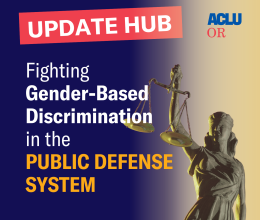
Case before Oregon Supreme Court is an opportunity to relieve collapsing public defense system
SALEM, Ore. — Last week the ACLU of Oregon (ACLU-OR) joined National ACLU, the Lawyers’ Committee for Civil Rights Under Law and the Lewis & Clark Law School Criminal Justice Reform Clinic in filing an amicus brief urging the Oregon Supreme Court to direct lower level courts to dismiss criminal cases when public defense attorneys are not available and to allow public defense attorneys to withdraw from cases (or object to new ones) if they are too overloaded to provide adequate representation for their client.
“No Oregonian should have to face criminal charges without the help of a lawyer who can be fully attentive to their case,” said Kelly Simon, legal director at ACLU-OR. “The criminal legal system cannot produce just outcomes when public defense attorneys don’t have the time to communicate with their clients, independently investigate their cases or interview witnesses and experts. Judges must exercise their authority to avoid appointing overburdened attorneys, permit attorneys to withdraw when carrying excessive caseloads, and dismiss cases when an attorney with capacity and competency cannot be found in a reasonable time period."
This May, Public Defenders of Marion County asked the Oregon Supreme Court to stop Marion County judges from forcing their attorneys to represent new clients because they were already over capacity with their existing caseload and therefore couldn’t ethically take more cases without jeopardizing their existing clients’ rights. The case demonstrates the severity and human impacts of Oregon’s ongoing public defense crisis.
Every Oregonian accused of a crime has a constitutional right to be represented by an attorney. For those who can’t afford one, the state is responsible for providing a public defense attorney. However, high caseloads combined with a shortage of public defense attorneys is creating a constitutional crisis. Thousands are caught in legal jeopardy — some in custody — because they aren’t able to afford an attorney and the state cannot fulfill its duty to provide an effective one.
While the impact of the public defense crisis is wide reaching, it disproportionately impacts Black, Indigenous, and Latino Oregonians. Black, Indigenous, and Latino people are arrested and incarcerated at much higher rates than white people. Nationwide, Black people are 4.7 times more likely than white people to have a public defender and Latino people are 2.1 times more likely to have a public defender than white people. Because of the higher rates of engagement with both the criminal legal system as a whole and public defenders in particular, this crisis inevitably creates disparate impacts for Black, Indigenous and Latino people.
The crisis has only worsened over the last year. As of July 18, there are currently 2,358 pretrial unrepresented individuals in the state, 133 of whom are in custody, according to the State’s data. One year ago, there were 700 pretrial, unrepresented individuals in the state, of whom 56 were in custody.
“In order to help our clients navigate the system with dignity and humanity, our attorneys need to be able to spend a reasonable amount of time on each case,” PDMC Executive Director, Shannon Wilson, wrote in their declaration to the court.
“For meaningful legal representation they need to be able to develop relationships of trust with each client. They need to have time to fully address the legal issues while thinking of the human component that each client represents — the impact of events on themselves, their families, and their jobs. Unfortunately, none of this is possible under present workloads. Without the ability to humanely do this job, our attorneys are just part of the pipeline of sending people to prison,” said Wilson.
The 2023 Oregon Legislature passed reforms and infused the system with significant funding to address some of the systemic public defense issues. However, ACLU-OR’s Simon said that while these long-term reforms are needed and welcomed, the people most impacted by this crisis need more immediate relief, which the recently-passed legislation does not provide.
Kara Davis, Gilliam County’s prosecutor, and Matt Ellis, Wasco County’s prosecutor are the only two elected prosecutors in Oregon who were formerly public defense attorneys. Both expressed support for the Court ordering broad and immediate relief that would require all stakeholders, including prosecutors, to limit the demand being placed on the finite resources of the criminal legal system. “I personally believe that it is critical for district attorneys, defense attorneys and judges to work collaboratively to determine a process to manage the total caseload in the criminal legal system,” Davis stated. “Courts can serve as an important facilitator and arbiter of cases that should be prioritized and cases that can be moved through and/or out of the system so that it remains sustainable for everyone. Dismissal without prejudice when there is simply no attorney available who can ethically take on another case is one way the Court can balance the constitutional rights of defendants and public safety interests of communities.”
Oral arguments, where the Oregon Supreme Court will hear from attorneys representing Wilson and the State, are scheduled for September 19, 2023.
###







